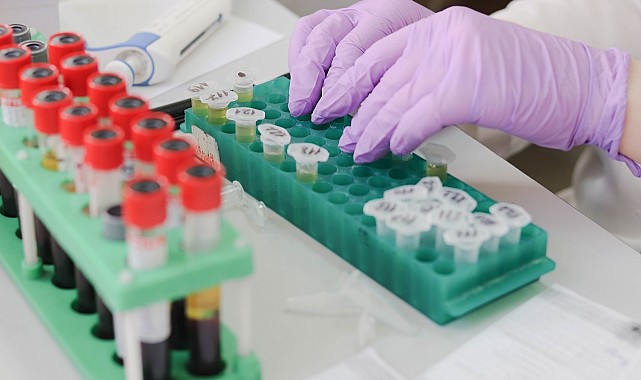The HLA-B27 gene is a gene that provides instructions for making a protein called human leukocyte antigen B27. This protein plays an important role in the immune system by helping to distinguish between the body's own cells and foreign invaders, such as viruses and bacteria.
What is the HLA-B27 Gene?
HLA-B27 is found on the surface of most cells in the body, and it presents small pieces of proteins to immune cells called T cells. These T cells can then recognize and attack cells that display foreign or abnormal proteins, including those found in infectious agents or cancer cells.Certain variations of the HLA-B27 gene have been linked to an increased risk of developing autoimmune disorders, such as ankylosing spondylitis, reactive arthritis, psoriatic arthritis, and inflammatory bowel disease. However, not everyone who carries the HLA-B27 gene will develop one of these conditions, and the gene is also found in people without autoimmune disorders.In summary, HLA-B27 is an important gene involved in the immune system and has been linked to an increased risk of developing certain autoimmune disorders.HLA-B27 Test
The HLA-B27 test is a blood test that checks for the presence of the HLA-B27 gene. The test is used to help diagnose certain autoimmune disorders that are associated with the gene, such as ankylosing spondylitis, reactive arthritis, psoriatic arthritis, and inflammatory bowel disease.The HLA-B27 test is not used to diagnose these conditions on its own, but it can be used in combination with other tests and medical evaluations to help make a diagnosis. A positive test result means that the HLA-B27 gene is present in the person's DNA, but it does not necessarily mean that the person has an autoimmune disorder. Similarly, a negative test result does not rule out the possibility of an autoimmune disorder.It's important to note that the HLA-B27 gene is found in a small percentage of the general population, so a positive test result does not necessarily mean that a person has an autoimmune disorder. In addition, some people with autoimmune disorders associated with the HLA-B27 gene may have a negative test result.If you have symptoms of an autoimmune disorder, your doctor may order an HLA-B27 test as part of the diagnostic process. However, the test alone is not sufficient to make a diagnosis, and additional tests and evaluations may be needed.How Do You Test for HLA-B27?
HLA-B27 testing is typically done through a blood test. The procedure involves the following steps:- Consultation with a doctor: First, you will need to schedule an appointment with a doctor or healthcare provider who can order the HLA-B27 test. They will discuss the reasons for the test, the potential risks and benefits, and what the results could indicate.
- Blood sample collection: Once your doctor has ordered the test, a healthcare professional will collect a blood sample from a vein in your arm. The sample will be sent to a laboratory for analysis.
- Laboratory analysis: In the laboratory, the blood sample is processed to isolate the DNA. The DNA is then analyzed to determine whether or not the HLA-B27 gene is present.
- Results interpretation: The test results will be interpreted by a healthcare professional, typically the doctor who ordered the test. A positive result means that the HLA-B27 gene is present in your DNA, while a negative result means that it is not.
HLA-B27 Test for Psoriatic Arthritis
The HLA-B27 test can be used as a diagnostic tool for psoriatic arthritis, but it is not the only test that is used to diagnose this condition. Psoriatic arthritis is an autoimmune disorder that can cause joint pain, stiffness, and swelling in people with psoriasis. It can also affect other parts of the body, including the skin, nails, and eyes.In addition to the HLA-B27 test, your doctor may order other tests and evaluations to diagnose psoriatic arthritis. These may include:- Physical exam: Your doctor will examine your joints, skin, nails, and eyes to look for signs of inflammation or other symptoms of psoriatic arthritis.
- Medical history: Your doctor will ask about your symptoms, medical history, and any family history of autoimmune disorders.
- Imaging tests: X-rays, MRI scans, or ultrasound tests may be ordered to look for signs of joint damage or inflammation.
- Skin biopsy: If you have psoriasis, a skin biopsy may be taken to help diagnose psoriatic arthritis.
- Blood tests: In addition to the HLA-B27 test, your doctor may order blood tests to look for signs of inflammation, such as elevated levels of C-reactive protein (CRP) or erythrocyte sedimentation rate (ESR).
HLA-B27 Test Results
The HLA-B27 test results can be positive or negative, depending on whether the HLA-B27 gene is present or absent in your DNA.If the test result is positive, it means that the HLA-B27 gene is present in your DNA. This does not necessarily mean that you have an autoimmune disorder associated with the gene, but it does mean that you are at an increased risk of developing one. It is important to note that the HLA-B27 gene is found in a small percentage of the general population, so a positive test result does not necessarily mean that you have an autoimmune disorder.If the test result is negative, it means that the HLA-B27 gene is not present in your DNA. However, this does not necessarily mean that you do not have an autoimmune disorder associated with the gene. Some people with autoimmune disorders associated with the HLA-B27 gene may have a negative test result.It's important to remember that the HLA-B27 test is not definitive on its own and must be considered in combination with other diagnostic tests and medical evaluations. If you have symptoms of an autoimmune disorder, your doctor may order additional tests or evaluations to help diagnose your condition.If you have questions or concerns about your HLA-B27 test results, it's important to talk to your doctor or healthcare provider. They can help explain what the results mean and what the next steps should be.What are the Benefits of Taking the HLA-B27 Test?
The HLA-B27 test can offer several benefits, including:- Early diagnosis: If you have symptoms of an autoimmune disorder associated with the HLA-B27 gene, such as ankylosing spondylitis, psoriatic arthritis, reactive arthritis, or inflammatory bowel disease, getting tested for the HLA-B27 gene can help with an earlier diagnosis. Early diagnosis and treatment can improve the chances of managing the condition effectively and preventing further damage to your health.
- Reduced anxiety: If you have a family history of autoimmune disorders associated with the HLA-B27 gene, getting tested for the gene can provide peace of mind or help detect the condition before it progresses.
- Personalized treatment: A positive HLA-B27 test result can help your doctor tailor your treatment plan to manage your symptoms more effectively. Treatment options may include medications, physical therapy, or lifestyle changes.
- Better management of your condition: If you have been diagnosed with an autoimmune disorder associated with the HLA-B27 gene, getting tested for the gene can help you and your doctor better manage your condition. Regular testing can help monitor disease activity, evaluate the effectiveness of treatment, and adjust the treatment plan as needed.









